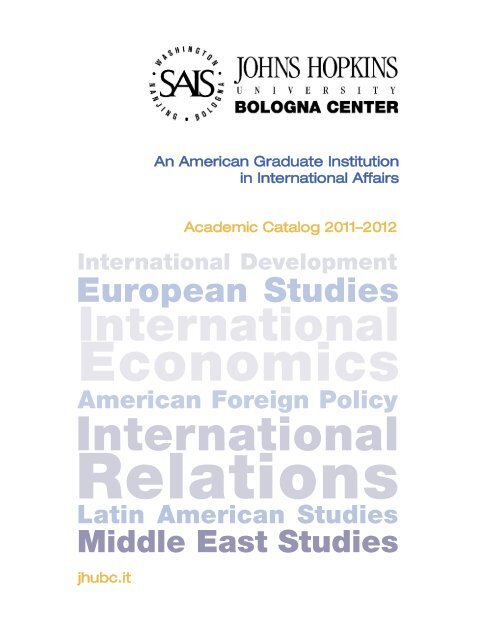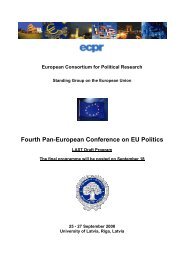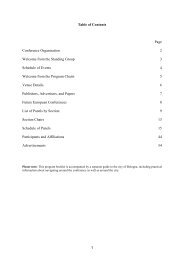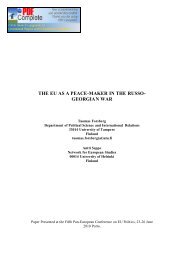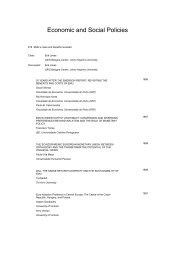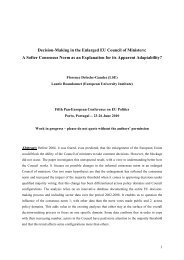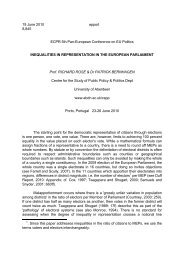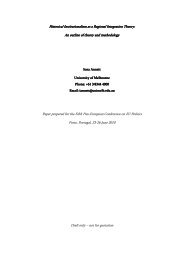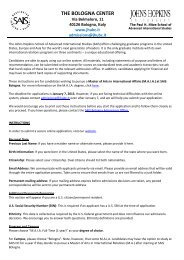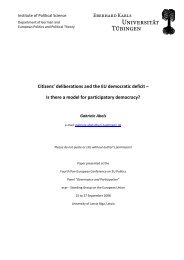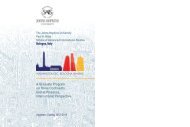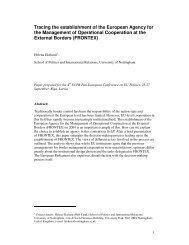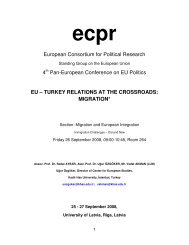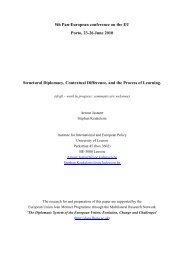Create successful ePaper yourself
Turn your PDF publications into a flip-book with our unique Google optimized e-Paper software.
An American Graduate Institution<br />
in International Affairs<br />
International Development<br />
European Studies<br />
International<br />
Economics<br />
American Foreign Policy<br />
International<br />
Relations<br />
Latin American Studies<br />
Middle East Studies<br />
jhubc.it<br />
Academic <strong>Catalog</strong> 2011–2012
The Johns Hopkins University<br />
The Paul H. Nitze School of Advanced International Studies<br />
SAIS <strong>Bologna</strong> <strong>Center</strong><br />
Via Belmeloro, 11<br />
40126 <strong>Bologna</strong>, Italy<br />
Tel: +39 051 2917 811<br />
Fax: +39 051 228 505<br />
admissions@jhubc.it<br />
jhubc.it<br />
The <strong>Bologna</strong> <strong>Center</strong> reserves the right<br />
to change without notice any programs,<br />
policies, requirements or regulations<br />
published in this catalog.<br />
The catalog is not to be regarded as a contract.<br />
December 2011
An American Graduate Institution in International Affairs<br />
Academic <strong>Catalog</strong> 2011–2012
Contents<br />
ACADEMIC CALENDAR<br />
ABOUT THE BOLOGNA CENTER<br />
BOLOGNA CENTER LIFE<br />
BOLOGNA CENTER SERVICES<br />
ADMISSIONS<br />
DEGREES<br />
THE ACADEMIC YEAR 2011–2012<br />
CURRICULUM<br />
FACULTY<br />
4<br />
6<br />
9<br />
11<br />
13<br />
16<br />
19<br />
21<br />
35
SAIS BOLOGNA CENTER<br />
2011–2012 Academic Calendar<br />
2011<br />
Monday, August 29–Monday, September 26<br />
Pre-term Italian, English, Economics and Core<br />
Theories courses<br />
Wednesday, September 28–Friday,<br />
September 30<br />
Orientation and registration<br />
(all students must attend)<br />
Friday, September 30<br />
Deadline for registering for courses and paying<br />
first semester tuition<br />
Monday, October 3<br />
First day of classes—first semester<br />
Monday, October 17<br />
Deadline for changing course registration<br />
(drop/add period ends)<br />
Monday, December 12<br />
Deadline for preliminary course registration for<br />
the second semester<br />
Wednesday, December 21<br />
Last day of classes before vacation<br />
Thursday, December 22–Wednesday,<br />
January 4<br />
Winter vacation<br />
VISIT THE SAIS<br />
BOLOGNA CENTER<br />
The <strong>Bologna</strong> <strong>Center</strong> has an open door<br />
policy for prospective students and<br />
encourages visits during the academic<br />
year when classes are in session.<br />
To arrange a visit, contact the Admissions<br />
Office at admissions@jhubc.it.<br />
See jhubc.it/video for a virtual tour.<br />
2012<br />
Thursday, January 5<br />
Classes resume<br />
Saturday, January 14<br />
Last day of classes—first semester<br />
Monday, January 16–Friday, January 27<br />
Examinations for the first semester<br />
Saturday, January 28–Sunday, February 5<br />
Semester recess<br />
Monday, February 6<br />
First day of classes—second semester<br />
and deadline for paying second semester tuition<br />
Monday, February 20<br />
Deadline for changing course registration<br />
(drop/add period ends)<br />
Friday, April 6<br />
Last day of classes before vacation<br />
Saturday, April 7–Sunday, April 15<br />
Spring vacation<br />
Monday, April 16<br />
Classes resume<br />
Saturday, May 12<br />
Last day of classes—second semester<br />
Monday, May 14–Friday, May 25<br />
Examinations for the second semester<br />
Saturday, May 26<br />
Commencement and closing ceremony<br />
4
Theories of International Relations • America and the World<br />
Since 1945 • Microeconomics • Macroeconomics • International<br />
Monetary Theory • International Trade Theory • European<br />
Economic History • Public Sector Economics • Statistical<br />
Methods for Business and Economics • Corporate Finance<br />
Econometrics • Contemporary Italian Politics • Comparative<br />
Central and Eastern European Politics • The EU and Its Institutions<br />
Problems of Transatlantic Relations • Problems in Modern<br />
European History & Historiography • Contemporary Russian<br />
Politics • Italian Art History and Culture • Introduction to Conflict<br />
Management • Foundations of International Law • Strategy &<br />
Policy • International Human Rights • Politics and Economics of<br />
International Energy • Science, Technology & International<br />
Affairs • Theory and Practice of International Peacekeeping<br />
Political Analysis and Strategy in United Nations Intervention<br />
THE BOLOGNA CENTER<br />
Peace & War • Case Studies in U.S. Foreign Policy • Crises in<br />
Context: the History Behind the Headlines • A Survey of Modern<br />
Latin American Politics • Introduction to Development • Political<br />
Islam and Change in the Mediterranean Area • Modernity and<br />
Nationalism in Egypt, Iran and Turkey • Evolution of the International<br />
System Comparative National Systems • Macroeconomics<br />
International Monetary Theory • International Trade Theory<br />
European Economic Integration • Asian Economic Development<br />
Econometrics • Game Theory in Application • Intellectuals and<br />
Politics • Contemporary Russian Foreign Policy • Soft Power<br />
America and the Politics of European Modernization • Europe in<br />
the Cold War • Germany after the Second World War • Selected<br />
Domestic and International Issues • NATO Research Seminar<br />
West European Political Economies • European Research<br />
Seminar • International Relations • Thucydides on War<br />
The Israeli-Palestinian Conflict: History, Politics, Narratives<br />
International Trade Law • International Security Cooperation<br />
Alliances and International Relations • Multiculturalism and the<br />
Human Rights of Women • International Organizations<br />
IR Theory and the Practice of International Politics • War and<br />
Conflict Resolution in Sub-Saharan Africa • Conflict Mediation and<br />
Dispute Resolution • Major Issues in U.S. Foreign Policy<br />
Advanced Seminar on U.S. Foreign Policy • Economic Survey of<br />
Latin America • State and Society in Contemporary Brazil<br />
Development Cooperation • Comparative Systems of the<br />
Developing World • North African Political Development<br />
Soviet Politics • Political Leadership of the Middle East
Academic Year 2011–2012<br />
ABOUT THE BOLOGNA CENTER<br />
Now in its sixth decade of operation, the <strong>Bologna</strong> <strong>Center</strong> is the European<br />
component of The Johns Hopkins University Paul H. Nitze School of<br />
Advanced International Studies (SAIS). The <strong>Bologna</strong> <strong>Center</strong> is a U.S. graduate<br />
school of international affairs located in <strong>Bologna</strong>, Italy that offers an<br />
interdisciplinary academic program emphasizing international economics,<br />
international relations, specializations either in functional areas or in regional<br />
studies, and languages.<br />
With campuses in Washington, D.C. and <strong>Bologna</strong>, Italy—and a center<br />
in Nanjing, China—SAIS produces professionals who understand the<br />
challenges and responsibilities of world leadership and have the skills to<br />
guide policy in both the public and private sectors. The <strong>Bologna</strong> <strong>Center</strong><br />
coordinates its academic program with SAIS in Washington, D.C. and<br />
maintains The Johns Hopkins University standards of instruction and<br />
academic integrity.<br />
The <strong>Bologna</strong> <strong>Center</strong><br />
The <strong>Bologna</strong> <strong>Center</strong> is an<br />
integral part of one of the<br />
leading U.S. institutions in<br />
higher education. Founded<br />
in Baltimore in 1876, The<br />
Johns Hopkins University is<br />
known throughout the world<br />
not only for its medical and<br />
public health schools but<br />
also for its programs in the<br />
arts, engineering, sciences<br />
and international affairs.<br />
Our History<br />
In 1955 a small group of scholars led by C. Grove Haines, a diplomatic historian at SAIS, founded the<br />
<strong>Bologna</strong> <strong>Center</strong>. Their mission was to prepare future leaders to reach beyond national boundaries and<br />
biases and to work cooperatively toward common international goals in the post-war period—a time<br />
when the world needed rebuilding and uniting. Home to the oldest university in Europe, <strong>Bologna</strong>’s<br />
tradition of education, cultural heritage and political vitality made it an attractive location for SAIS’s European<br />
branch. In today’s increasingly complex and globalized world, the mission of the SAIS <strong>Bologna</strong><br />
<strong>Center</strong> is more relevant and necessary than ever.<br />
An International Context<br />
Approximately half of all SAIS M.A. students spend their first year in <strong>Bologna</strong> and their second year in<br />
Washington, D.C. The <strong>Bologna</strong> <strong>Center</strong>’s interdisciplinary program parallels the curriculum at the<br />
Washington campus, with all courses taught in English. This combination—one year in <strong>Bologna</strong> and<br />
one year in Washington—provides a mix of perspectives that enriches a student’s understanding of<br />
international affairs.<br />
<strong>Bologna</strong> <strong>Center</strong> students come from dozens of different countries, creating a diverse community of<br />
learners who offer various views on the world’s most pressing issues.<br />
The <strong>Bologna</strong> <strong>Center</strong>
About the <strong>Bologna</strong> <strong>Center</strong><br />
A range of other programs are offered at the <strong>Center</strong>: research-oriented degrees, one-year degrees<br />
and joint degrees. Approximately 6,500 graduates live and work in more than 110 countries around the<br />
world, forming a loyal alumni network.<br />
Our Faculty<br />
The <strong>Bologna</strong> <strong>Center</strong>’s core full-time faculty maintains continuity, assures curriculum quality, relevance<br />
and coherence and mentors students. They are supplemented by nearly 40 adjunct professors, visiting<br />
faculty and research fellows who travel to <strong>Bologna</strong> from around Europe and beyond, all of whom are<br />
associated with world renowned universities, research and policy centers, international NGOs, consulting<br />
firms and financial institutions. The academic structure follows the American university model,<br />
emphasizing informal seminars, open dialogue between professors and students, and a progressive<br />
course of study requiring regular exams and papers during each semester. Most classes consist of 10<br />
to 20 students, and the student-faculty ratio is approximately 6 to 1.<br />
As academics and practitioners, participants and observers, <strong>Bologna</strong> <strong>Center</strong> faculty and scholars<br />
have witnessed firsthand and shaped the trends, ideas and events that have changed our world. Their<br />
expertise covers the spectrum of economic trends, foreign policy developments and political debates in<br />
Europe, North America, Asia, Latin America, Africa and the Middle East.<br />
Visit jhubc.it/our-faculty for profiles of the <strong>Center</strong>’s faculty and research fellows.<br />
The Student Experience<br />
The <strong>Bologna</strong> <strong>Center</strong> program offers an unsurpassed student experience. The small size of the student<br />
body coupled with its international diversity allows students to communicate across national borders<br />
DEGREE PROGRAMS<br />
OFFERED<br />
Master of Arts<br />
in International Relations (M.A.)<br />
A degree that requires one year in <strong>Bologna</strong><br />
and one year in Washington, D.C.<br />
Master of Arts<br />
in International Affairs (M.A.I.A.)<br />
A two-year research-oriented degree<br />
offered only in <strong>Bologna</strong><br />
Master of International Public Policy<br />
(M.I.P.P.)<br />
A degree for mid-career professionals<br />
offered in <strong>Bologna</strong><br />
<strong>Bologna</strong> <strong>Center</strong> Diploma<br />
in International Studies<br />
A one-year diploma for students who<br />
successfully complete one year of course<br />
work in <strong>Bologna</strong><br />
(See page 16 for more details.)<br />
A Unique Perspective<br />
on International Relations<br />
The option of spending a year in <strong>Bologna</strong><br />
and a year in Washington gives students<br />
an unparalleled and complementary<br />
understanding of international relations.<br />
With 200 students, about half from North<br />
America and half from more than 40 other<br />
countries, SAIS’s <strong>Bologna</strong> <strong>Center</strong> offers<br />
a varied student experience that brings<br />
richness and vitality to academic life.<br />
Students in <strong>Bologna</strong> attend small classes<br />
taught by full-time faculty and renowned<br />
adjunct professors. All students study<br />
economics in addition to a functional or<br />
regional concentration, and proficiency in<br />
at least one foreign language is required<br />
for graduation. Combined with exposure<br />
to guest lectures by leaders on the global<br />
scene, the <strong>Center</strong> fosters a lively learning<br />
environment.<br />
7
Academic Year 2011–2012<br />
and cultures, while building a sense of community and collaboration among the nations of the world.<br />
Equipped with strong economics and analytical skills, language competency and international<br />
experience, <strong>Bologna</strong> <strong>Center</strong> graduates have the ability to apply theory to real-world problems, making<br />
them valued contributors to any field that involves international relations. Today’s graduates are leaders<br />
who can be found in prominent positions around the globe—in foreign ministries and government<br />
agencies, international organizations, multinational corporations, banks and financial services, non-profit<br />
organizations, the media, research centers and universities worldwide.<br />
Our Campus<br />
The <strong>Center</strong>’s newly renovated building is located in the heart<br />
of <strong>Bologna</strong>’s historical university district. It includes a library,<br />
computer center, language laboratory and auditorium, which is<br />
equipped with translation, videoconferencing and projection<br />
facilities. The <strong>Center</strong> also contains seminar rooms, faculty and<br />
administrative offices, a reception and a large conference<br />
room—on its “Penthouse” floor—with a terrace overlooking<br />
the city of <strong>Bologna</strong>. Students, faculty and staff gather at the<br />
<strong>Center</strong>’s coffee bar, which also has garden seating. The<br />
student lounge is equipped with a full entertainment center<br />
and videoconferencing facilities.<br />
“The rigor and structure<br />
City of <strong>Bologna</strong><br />
offered by the U.S. university<br />
The city of <strong>Bologna</strong>, steeped in European history and linked<br />
system was something<br />
with important modern and contemporary political movements,<br />
I needed in order<br />
is an ideal environment for studying international affairs,<br />
to push myself.”<br />
contemporary European politics and history, and the shifting<br />
political dynamics and changing demographics of the<br />
Laurent Bachmann<br />
Mediterranean rim.<br />
Lienz, Austria<br />
<strong>Bologna</strong>’s history spans three millennia with Etruscan,<br />
M.A. Candidate (BC11)<br />
Villanovan and Roman ruins on display throughout the city.<br />
The city also thrives in the present, with one of the highest<br />
living standards in Europe. From the main piazza to the<br />
remnants of medieval city walls, <strong>Bologna</strong>’s historic center features a system of nearly 40 kilometers of<br />
porticoes lining the streets and a pair of medieval towers guarding over the city’s center.<br />
A cultural city of the first order, <strong>Bologna</strong> is home to a variety of museums, theaters, cinemas and<br />
libraries. Students have access to a full range of musical events, from opera, symphony and chorus to<br />
contemporary concerts, intimate jazz clubs, and street performances. The art scene, whether in the<br />
numerous galleries around town or in exhibits at several of the city’s museums, offers visual excitement.<br />
Sports, too, play a vital part in the life of the bolognesi. The city has its own soccer and basketball<br />
teams as well as numerous nonprofessional opportunities for a wide range of sporting activities. Skiing<br />
in the Apennines, water sports in the Mediterranean or Adriatic, mountain climbing in the Dolomites,<br />
or trekking in Cinque Terre are only a few of the outdoor activities that <strong>Bologna</strong> <strong>Center</strong> students enjoy.<br />
The University of <strong>Bologna</strong>, established in 1088, is Europe’s oldest. With 95,000 students, it is one<br />
of the largest in Italy. In addition to the <strong>Bologna</strong> <strong>Center</strong>, other American and European university<br />
programs are located in <strong>Bologna</strong>, influencing its culture, nightlife and ambiance.<br />
Located at the crossroads of Italy’s network of railways and highways, <strong>Bologna</strong> is an hour’s drive<br />
from Florence and the Adriatic coast and no more than two or three from Venice, Verona, Milan and<br />
Rome. The city’s international airport is the third largest in Italy, with daily flights served by major<br />
European and budget airlines.<br />
8
<strong>Bologna</strong> <strong>Center</strong> Life<br />
BOLOGNA CENTER LIFE<br />
There are many ways for students to become engaged in the school and the <strong>Bologna</strong> community.<br />
At the <strong>Bologna</strong> <strong>Center</strong>, students may serve in the student government and its committees and on<br />
the journal or yearbook staffs. Students also participate in numerous social and cultural activities and<br />
organize events ranging from international dinners and travel programs, to musicals, film series and<br />
sports teams. On average, two or four talks are given weekly at the <strong>Center</strong> through the Seminar Series.<br />
Research assistant opportunities are offered by the <strong>Bologna</strong> Institute for Policy Research, the<br />
<strong>Center</strong>’s research division, while the <strong>Center</strong> for Constitutional Studies and Democratic Development,<br />
a joint project with the University of <strong>Bologna</strong>, also provides ways for students to be involved in study<br />
trips and other projects.<br />
Leadership Opportunities<br />
The <strong>Bologna</strong> <strong>Center</strong> student government leads an active, engaged set of committees which provide<br />
educational, social and travel opportunities for students. The government acts as a liaison between the<br />
student body and the faculty and administration and works to enhance student life at the <strong>Center</strong>, in<br />
<strong>Bologna</strong> and in Italy. Two elected students from each class also serve on the SAIS Student Government<br />
Association during their second year in Washington, D.C. In addition, the chair of the <strong>Bologna</strong> <strong>Center</strong><br />
Advisory Council selects one student each year, based on outstanding leadership qualities, grades and<br />
commitment to the <strong>Center</strong>’s goals, for a three-year term on the Council.<br />
View of the city of <strong>Bologna</strong> and surrounding hills
Academic Year 2011–2012<br />
Student Publications<br />
Students interested in academic editing and publishing produce the <strong>Bologna</strong> <strong>Center</strong> Journal of International<br />
Affairs, now in its 15th year of publication. The student-run journal gives students the opportunity to<br />
contribute to a forum for scholarly discourse and academic discussion about current issues and new<br />
ideas of interest to the international affairs community.<br />
Extracurricular Activities<br />
Each <strong>Bologna</strong> <strong>Center</strong> class throughout the <strong>Center</strong>’s nearly six decades has created its own identity by<br />
forming interest groups. Popular activities include teams for American and European football, as well<br />
as basketball, softball and running clubs. The musically inclined have organized rock bands, and classical,<br />
instrumental and singing groups. Salsa, tango and other dance classes include weeks spent practicing the waltz<br />
for the Austrian Ball. Students have also created interest groups for debate, regional interests, film series,<br />
current events and dozens of other activities.<br />
Seminar Series<br />
Various seminar series are organized at the <strong>Bologna</strong> <strong>Center</strong> throughout the academic year by the<br />
<strong>Bologna</strong> Institute for Policy Research (BIPR). Seminars are structured thematically in the following<br />
areas, each hosted by a <strong>Bologna</strong> <strong>Center</strong> faculty member: International Relations, Economics, History,<br />
Conflict Management, European Studies, Middle East Studies, American Foreign Policy, and Risk.<br />
These events, held two to four times a week, bring prominent scholars and practitioners from Europe,<br />
the United States and other parts of the world to present current research to the <strong>Bologna</strong> <strong>Center</strong> and<br />
local community. Recent speakers include Mario Draghi, Romano Prodi, Azar Nafisi, Kenneth Waltz,<br />
Andras Sajo, Tariq Ramadan, Kerstin Müller and Lord Robert Skidelsky. Lecture summaries, threequestion<br />
video interviews and full audio from each seminar are posted online following the event.<br />
<strong>Bologna</strong> Institute for Policy Research<br />
The <strong>Bologna</strong> Institute for Policy Research (BIPR) is the research division of the SAIS <strong>Bologna</strong> <strong>Center</strong>.<br />
BIPR promotes problem-oriented, interdisciplinary research in international policy, drawing upon the<br />
global network of SAIS scholars and the comparative advantage of the <strong>Bologna</strong> <strong>Center</strong> as a transatlantic<br />
institution for research and teaching with more than fifty years of experience in Europe. Resident Faculty<br />
Fellows lead BIPR research programs in six main policy areas; each research program is enriched by visiting<br />
scholar residencies, seminars, conferences and publications. BIPR works with five student research assistants<br />
each semester to produce summary content and three-question video interviews from the thematic seminar<br />
series hosted at the <strong>Bologna</strong> <strong>Center</strong>. This activity is a core element of BIPR’s mission to share the work<br />
of scholars and practitioners associated with the <strong>Bologna</strong> <strong>Center</strong> with the wider policy community,<br />
providing a pivotal forum for thought and debate in international public policy.<br />
To view the institute’s activities, visit jhubc.it/BIPR.<br />
<strong>Center</strong> for Constitutional Studies and Democratic Development<br />
The <strong>Center</strong> for Constitutional Studies and Democratic Development (CCSDD) is a partnership between<br />
the <strong>Bologna</strong> <strong>Center</strong> and the Law Faculty of the University of <strong>Bologna</strong>. Its mission is to carry out research<br />
related to constitutional law, especially regarding countries undergoing a transition to democracy. The<br />
CCSDD collaborates with other universities and international institutes; it facilitates research among<br />
professors and Ph.D. students and hosts visiting experts of comparative constitutional law. The<br />
CCSDD hires up to 10 interns a year, and during the year <strong>Bologna</strong> <strong>Center</strong> students can become<br />
involved in comparative constitutional law research projects and publications, the Human Rights Nights<br />
Film Festival, study trips to Balkan countries and other initiatives.<br />
Visit ccsdd.org for more information.<br />
10
<strong>Bologna</strong> <strong>Center</strong> Services<br />
BOLOGNA CENTER SERVICES<br />
Student Services<br />
Students Services helps students adapt to the <strong>Bologna</strong> community, including medical referrals, and aids<br />
students in times of crisis, in understanding a new culture, and in discovering the cultural, social and<br />
volunteer opportunities in <strong>Bologna</strong>.<br />
The Student Services Coordinator also serves as Academic Coordinator, providing advising for all<br />
students. Questions concerning the academic program, teaching, grading and exams are first referred to<br />
this office. This office also deals with issues concerning the Honor Code and sexual harassment.<br />
Career Services<br />
Career Services at the <strong>Bologna</strong> <strong>Center</strong> focuses primarily on planning and counseling for first-year students,<br />
helping them develop career objectives and management skills. The office also develops employer<br />
relations in Europe to facilitate job and internship opportunities for SAIS students across all campuses.<br />
To make use of Career Services at SAIS, all students are required to attend the office’s professional<br />
development course, which covers career research,<br />
Students attending a lecture at the <strong>Center</strong>’s<br />
Fondazione del Monte-Unicredit Auditorium<br />
A Career Services professional<br />
development course<br />
self-assessment, writing résumés, CVs and cover<br />
letters, networking and interviewing. Through<br />
individualized career counseling, students receive<br />
guidance on conducting employment searches<br />
and building a career strategy.<br />
During the academic year, Career Services<br />
invites people who have pursued successful<br />
careers in the private, public and non-profit<br />
sectors to share their experiences with the student<br />
body. The office also organizes career development<br />
trips for students, including a finance trip to<br />
London in October and trips to London and<br />
Brussels over the semester recess. These trips<br />
expose students to various employment sectors and<br />
career options and facilitate contact with alumni.<br />
Every summer, students leave the <strong>Bologna</strong><br />
<strong>Center</strong> to pursue interesting jobs and internships<br />
around the world. On average, over two-thirds of<br />
the student body work in either an internship or<br />
full-time job following their year at the <strong>Center</strong>.<br />
Some examples of where last year’s students<br />
worked include:<br />
A.T. Kearney, Washington, D.C., U.S.<br />
Askhara Foundation, Bangalore, India<br />
Bain & Company, Munich, Germany<br />
Brookings Institution, Washington, D.C., U.S.<br />
Cambridge Energy Alliance, Cambridge, U.S.<br />
Carnegie Middle East <strong>Center</strong>, Beirut, Lebanon<br />
Dow Jones Newswires, São Paulo, Brazil<br />
11
Academic Year 2011–2012<br />
EU Police Mission, Sarajevo,<br />
Bosnia and Herzegovina<br />
Goldman Sachs, London, U.K.<br />
International Rescue Committee, Addis Ababa,<br />
Ethiopia<br />
International Trade Centre, Geneva, Switzerland<br />
JP Morgan, New York, U.S., London, U.K.<br />
Kaiser Associates, Vlaeburg, South Africa<br />
ManattJones, Mexico City, Mexico<br />
Millennium Challenge Corporation, Ulaanbaatar,<br />
Mongolia<br />
Morgan Stanley, New York, U.S.<br />
OECD, Paris, France<br />
Organization for Security and Cooperation<br />
in Europe, Pristina, Kosovo<br />
Roland Berger, Munich, Germany, Beijing, P.R.C.<br />
U.S. Commercial Service, Ho Chi Minh City,<br />
Vietnam<br />
U.S. Department of State, Numerous Bureaus<br />
and Missions Abroad<br />
United Nations Headquarters, New York, U.S.<br />
United Nations Development Program,<br />
Bratislava, Slovakia, Suva, Fiji<br />
Library Services<br />
The Robert H. Evans library is the heart of the<br />
<strong>Bologna</strong> <strong>Center</strong>’s academic life. This three-story<br />
library contains a specialized collection of more<br />
than 85,000 volumes, one of continental Europe’s<br />
richest English-language collections on international<br />
relations. Holdings are concentrated in<br />
international affairs, economics, international law,<br />
and European history and politics. The library<br />
also has an extensive collection of Englishlanguage<br />
materials on Italian government and<br />
politics. Visit the online catalog at catalog.jhubc.it.<br />
The library provides access to a wide range of<br />
electronic resources and offers interlibrary loan<br />
services to current students. The <strong>Center</strong>’s students<br />
also have access to the rich bibliographic resources<br />
of the <strong>Bologna</strong> area, with its combined holdings<br />
of more than 3 million volumes. Four dedicated<br />
computer stations are available for online research,<br />
and the library offers both cable and wireless<br />
connections to the internet.<br />
Computer Services and Language Lab<br />
Wireless access is available throughout the building,<br />
and students can depend on technical support<br />
related to academic requirements throughout the<br />
academic year. Students have access to a computer<br />
room, solely for their use. It contains 16 work stations<br />
and high-volume, black-and-white and color printers,<br />
which can also copy and scan to create PDF<br />
documents. A color scanner is also available.<br />
The <strong>Center</strong>’s language lab features 12<br />
multimedia computer stations equipped with the<br />
most updated and state-of-the-art language-learning<br />
software.<br />
Alumni Relations<br />
Alumni Relations fosters ongoing relationships<br />
with <strong>Bologna</strong> <strong>Center</strong> alumni around the world.<br />
The <strong>Center</strong>’s alumni have strong ties to the<br />
school and the city. They host career panels and<br />
trips, help recruit new students, raise the <strong>Center</strong>’s<br />
visibility and advise on prospective speakers,<br />
professors and supporters. The Alumni Relations,<br />
Career Services and Development offices work<br />
together to build employment opportunities in<br />
Europe for current and former students and to<br />
raise funds for fellowships and research activities.<br />
European alumni chapters meet for<br />
professional development, networking and<br />
fundraising. Alumni in Austria meet every month,<br />
and alumni in Belgium, France, Germany, the<br />
Netherlands and the United Kingdom have<br />
regular activities throughout the year. In London,<br />
Bolognesi a Londra is the newest addition to the<br />
calendar of <strong>Bologna</strong> <strong>Center</strong> alumni events. In the<br />
United States, <strong>Bologna</strong> alumni gather annually<br />
under the auspices of the Amici di <strong>Bologna</strong>. The<br />
<strong>Center</strong> also continues to hold its traditional<br />
alumni weekend reunion every year, which draws<br />
several hundred former students from around the<br />
world to the city where they met, to renew their<br />
ties with classmates and the <strong>Center</strong>.<br />
12
Admissions<br />
ADMISSIONS<br />
How to Apply<br />
Candidates must have completed their undergraduate degree before enrolling. In many cases incoming<br />
SAIS <strong>Bologna</strong> <strong>Center</strong> students have majors in international relations, political science, law, economics or<br />
history. Students with majors in other disciplines are also encouraged to apply if they are interested in<br />
pursuing a career in international affairs.<br />
All candidates are invited to use the secure online form when applying. Most elements of the<br />
application can be submitted online, including the candidate’s statement of purpose and CV, and letters<br />
of recommendation. Hard copies of undergraduate transcripts and the results of standardized tests<br />
should be sent to the relevant Admissions office.<br />
SAIS has Admissions officers handling different pools of applicants:<br />
Applications from non-U.S.<br />
citizens/permanent residents<br />
wishing to start in <strong>Bologna</strong><br />
are managed by the SAIS <strong>Bologna</strong><br />
Admissions Office in <strong>Bologna</strong><br />
SAIS <strong>Bologna</strong> Admissions Office<br />
via Belmeloro, 11<br />
40126 <strong>Bologna</strong> - Italy<br />
Tel +39 051 291 7811<br />
Fax +39 051 228 505<br />
admissions@jhubc.it<br />
jhubc.it/admissions<br />
Applications from U.S.<br />
citizens/permanent residents<br />
wishing to start in <strong>Bologna</strong><br />
are managed by the SAIS DC<br />
Admissions Office in Washington<br />
SAIS DC Admissions Office<br />
1740 Massachusetts Avenue, N.W.<br />
Washington, D.C. 20036 - U.S.A.<br />
Tel +1 202 663 5700<br />
Fax +1 202 663 7788<br />
admissions.sais@jhu.edu<br />
sais-jhu.edu/admissions<br />
U.S. nationals with a second, or dual, citizenship have the choice of whether to apply through <strong>Bologna</strong><br />
or Washington.<br />
Details and application instructions can be found at jhubc.it/admissions/applicationinstructions.cfm<br />
or by contacting one of the Admissions offices.<br />
The deadline for applications for enrollment in the fall term is February 1, 2012 for candidates<br />
applying through <strong>Bologna</strong>, and January 7, 2012 for candidates applying through DC.<br />
Applications for mid-year admission may be considered on a space-available basis and are<br />
due by November 1.<br />
13
Academic Year 2011–2012<br />
Requirements<br />
A university degree and excellent knowledge of English are<br />
the minimum requirements for enrollment. Candidates<br />
finishing their last year of undergraduate study may apply<br />
provided they complete their university degree before<br />
beginning at the <strong>Bologna</strong> <strong>Center</strong>.<br />
All classes are conducted in English. Non-native English<br />
speakers must demonstrate competence in the language by<br />
presenting the results of a TOEFL, IELTS or CPE test, taken<br />
not more than two years before the application deadline.<br />
Candidates who apply through the SAIS <strong>Bologna</strong><br />
Admissions Office are not required to take the GRE or the<br />
GMAT, but they are strongly encouraged to take one of<br />
these tests as the results can indicate if the applicant is ready<br />
for SAIS and a good score will enhance a candidate’s chances<br />
of admission.<br />
Interviews and Decisions<br />
Where possible, applicants are interviewed in <strong>Bologna</strong>, other<br />
European cities, Washington or New York, usually in late<br />
February and March. The interview helps determine the<br />
applicant’s academic preparation, analytical capabilities and<br />
suitability for participating in the international community of<br />
students at the <strong>Bologna</strong> <strong>Center</strong>. Decisions are communicated<br />
by mid-April.<br />
Tuition and Fees<br />
SAIS <strong>Bologna</strong> <strong>Center</strong> fees are in euros. Tuition for SAIS<br />
<strong>Bologna</strong> is €29,580 for the 2011–2012 academic year. One<br />
half of the tuition fee is payable upon registration for courses<br />
at the beginning of the first semester, together with a Student<br />
Government Association fee of €30. The remainder is<br />
payable by the first day of classes of the second semester.<br />
After being accepted into the program, students also pay a<br />
matriculation fee.<br />
There is a separate fee for the pre-term program. All<br />
pre-term courses cost €800 each, except Survival Italian,<br />
which costs €400. A €200 nonrefundable deposit, due in early<br />
July, is required for each pre-term course.<br />
An online Principles of Economics course is offered by<br />
SAIS in Washington, D.C. for US$1,000. See the Academics<br />
section of the SAIS Washington website for more information,<br />
registration and deposit requirements.<br />
For information about withdrawal and refund policies for<br />
regular courses, please contact the <strong>Bologna</strong> <strong>Center</strong> Business<br />
Office at businessoffice@jhubc.it. Other refunds are given<br />
on a graduated basis.<br />
“People come to SAIS<br />
from every perspective<br />
and background,<br />
which leads you to discuss<br />
things and contemplate<br />
working in areas<br />
you had never<br />
heard about.”<br />
Thishani Nadesan<br />
London, U.K.<br />
M.A. Candidate (BC11)<br />
The Robert H. Evans Library<br />
14
Admissions<br />
Financial Assistance:<br />
Grants, Fellowships and Loans<br />
SAIS Washington administers financial aid for U.S. students to<br />
study at <strong>Bologna</strong>. All inquiries should be directed to SAIS DC<br />
Admissions or the Financial Aid Office.<br />
SAIS <strong>Bologna</strong> administers a substantial amount of financial<br />
assistance for non-U.S. students to study at the <strong>Center</strong>. A large<br />
part of this funding is provided by various foundations and<br />
government agencies, mainly in Europe, and citizenship of the<br />
donor country is generally required.<br />
The school also allocates part of its annual budget to<br />
student financial assistance. These funds are available for all<br />
admitted students and are allocated on the basis of academic<br />
merit and financial need.<br />
Those who need financial assistance are also encouraged to<br />
“There are few schools<br />
seek funding from government agencies, foundations and other<br />
that can provide you<br />
organizations. Fellowships and financial aid information and<br />
with such a variety<br />
application forms are available on the SAIS <strong>Bologna</strong> website<br />
of world-class<br />
jhubc.it/admissions/fellowshipsandfinaid.cfm.<br />
level approaches:<br />
Non-U.S. students who plan to continue for a second year<br />
one course focusing<br />
of study in Washington may re-apply for financial aid toward the<br />
on technical aspects,<br />
end of the first semester in <strong>Bologna</strong>. Awards are based primarily<br />
another on economic<br />
on academic performance during the first semester and on<br />
aspects, a third one<br />
demonstrated financial need. Funding for non-U.S. students for<br />
on diplomatic aspects.”<br />
the second year may not be as extensive as first year awards and<br />
often deadlines may be very early, so all students who plan to<br />
Aurélien Billot<br />
continue in the two-year program<br />
Paris, France<br />
are encouraged to begin seeking<br />
M.A. Candidate (BC11)<br />
outside sources of funding for the<br />
second year upon acceptance to<br />
the program.<br />
In addition, SAIS has an agreement in place with a major European<br />
bank to provide competitive student loans to European Union citizens who<br />
are pre-approved by Johns Hopkins. These loans are allocated as part of the<br />
student’s financial aid package which may include grants and/or loans.<br />
What We Look For in an Applicant<br />
SAIS attracts highly motivated students from around the globe who<br />
are dedicated to mastering the practice of international relations<br />
and making a difference in the world. The SAIS student body is<br />
extremely diverse, and admission to the school is competitive. The<br />
Admissions Committee seeks applicants with demonstrated leadership<br />
ability, practical professional experience, international exposure, solid<br />
academic preparation and foreign language aptitude.<br />
15
Academic Year 2011–2012<br />
DEGREES<br />
Master’s and Diploma Programs<br />
Master of Arts in International Relations (M.A.)<br />
All students admitted to the <strong>Bologna</strong> <strong>Center</strong> are eligible to complete the two-year master’s program. U.S.<br />
students who choose to study in <strong>Bologna</strong> generally do so in their first year before completing their degree in<br />
Washington, D.C. However, first-year students in Washington may elect to spend a second year in <strong>Bologna</strong>.<br />
M.A. candidates generally take four courses each semester in addition to a language course, which<br />
may be necessary to gain proficiency. For more information on the degree requirements, see the<br />
Academics section of the SAIS Washington website.<br />
Master of Arts in International Affairs (M.A.I.A.)<br />
The M.A.I.A. is a research-oriented degree that requires the preparation and defense of a thesis.<br />
Students are not admitted directly to this two-year program and instead submit an additional application<br />
during the first year of study in <strong>Bologna</strong>. Admission is based on an applicant’s academic performance in<br />
the first semester, academic potential and a research proposal which, if accepted, becomes the subject<br />
of an M.A.I.A. thesis in the second year.<br />
Non-native English speakers must pass a comprehensive proficiency examination to demonstrate<br />
the required competence in English. Native English speakers must pass an examination by the end of<br />
the second year to demonstrate proficiency in one of the foreign languages offered at the <strong>Center</strong>.<br />
Applicants must also show competence or progress in economics. For more information on the<br />
requirements for this degree, visit the Academics section of the SAIS <strong>Bologna</strong> website.<br />
Master of International Public Policy (M.I.P.P.)<br />
The M.I.P.P. degree is for mid-career professionals in international fields who have a minimum of nine<br />
years of work experience after obtaining at least an undergraduate degree. Some applicants are on leave<br />
from employment as diplomats, members of the military, business executives or journalists. The <strong>Bologna</strong><br />
<strong>Center</strong> does not provide financial aid for M.I.P.P. students, but employers will often sponsor these studies.<br />
Candidates for the M.I.P.P. degree complete eight courses, preferably as a full-time student within<br />
one year. If necessary, an M.I.P.P. candidate can request part-time status to complete the degree in two<br />
years. Non-native English speakers must pass the<br />
English proficiency exam before graduation.<br />
Candidates plan their academic programs with the<br />
guidance of a faculty adviser, based on their<br />
academic interest. For more information on the<br />
requirements for this degree, visit the Academics<br />
section of the SAIS <strong>Bologna</strong> website.<br />
SAIS <strong>Bologna</strong> Diploma in International<br />
Studies<br />
Candidates for the one-year diploma must complete<br />
a minimum of two semesters at the <strong>Bologna</strong><br />
<strong>Center</strong> as full-time resident students. Requirements<br />
include passing a minimum of eight courses<br />
during the academic year, not including a<br />
language course. For the language requirements,<br />
16
Degrees<br />
non-native English speakers must either pass an<br />
English proficiency examination by the end of<br />
the year or successfully complete two semesters<br />
of a course in advanced English. Native English<br />
speakers must either pass a language proficiency<br />
examination or successfully complete two regular<br />
semester courses in any of the foreign languages<br />
offered at the <strong>Center</strong>. The intensive Italian course<br />
can be counted as a one-semester language<br />
course. However, this does not apply to the<br />
intensive English course or Survival Italian. For<br />
more information on the requirements for this<br />
degree, visit the Academics section of the SAIS<br />
<strong>Bologna</strong> website.<br />
Joint Degree and Other Programs<br />
M.A. students at the <strong>Bologna</strong> <strong>Center</strong> may apply<br />
for the following programs. Students applying to<br />
a joint degree program must submit separate<br />
applications to each school and satisfy the<br />
admission requirements of both. For more<br />
information, contact the Admissions Office at<br />
SAIS DC or visit the Academics section of the<br />
SAIS Washington website.<br />
For more information on the M.A.I.A.-M.A.I.S.<br />
degree (Diplomatic Academy of Vienna) and the<br />
M.A.I.A.-Laurea Magistrale degree (University of<br />
<strong>Bologna</strong>, Forlì), visit jhubc.it/academics/degreeprograms/coop.cfm.<br />
Master of Business Administration<br />
INSEAD<br />
Master of Business Administration<br />
Wharton School, University of Pennsylvania<br />
Master of Business Administration<br />
Tuck School of Business, Dartmouth College<br />
Juris Doctorate<br />
Stanford University Law School<br />
Juris Doctorate<br />
University of Virginia School of Law<br />
Master of Health Science<br />
Johns Hopkins Bloomberg School of Public<br />
Health<br />
Master of Public Administration<br />
Maxwell School of Citizenship and Public<br />
Affairs, Syracuse University<br />
The following programs are available only<br />
through SAIS <strong>Bologna</strong>:<br />
M.A.I.A.-M.A.I.S. Program<br />
SAIS <strong>Bologna</strong> and the Diplomatic Academy of<br />
Vienna<br />
This two-year research program allows SAIS<br />
<strong>Bologna</strong> students to spend a second year at the<br />
Diplomatic Academy of Vienna, studying for the<br />
Master of Advanced International Studies<br />
(M.A.I.S.). Upon successful completion of course<br />
work and defense of a thesis, the student will be<br />
awarded the M.A.I.S. degree. Conversely, students<br />
enrolled at the Diplomatic Academy, after<br />
successful completion of one year of study, may<br />
spend a second year of study at the <strong>Bologna</strong><br />
<strong>Center</strong>. Upon completion of a thesis, six<br />
additional courses and an oral examination, they<br />
will be awarded the M.A.I.A. by SAIS.<br />
M.A.I.A.-Laurea Magistrale Program<br />
SAIS <strong>Bologna</strong> and University of <strong>Bologna</strong><br />
SAIS <strong>Bologna</strong> and University of <strong>Bologna</strong>, Forlì<br />
This two-year program can be completed either<br />
by spending the first year at SAIS <strong>Bologna</strong> and<br />
the second year at the University of <strong>Bologna</strong> or<br />
17
Academic Year 2011–2012<br />
the University of <strong>Bologna</strong>, Forlì, or vice versa.<br />
Students must apply separately to both<br />
institutions. Students who begin at the University<br />
of <strong>Bologna</strong> and complete seven courses there,<br />
take six additional courses, complete a thesis and<br />
an oral examination during a second year at SAIS<br />
<strong>Bologna</strong> will receive both a Laurea Magistrale in<br />
Scienze Internazionali e Diplomatiche<br />
(International Relations and Diplomatic Affairs)<br />
and an M.A.I.A. degree.<br />
Students who complete their first year course<br />
work at SAIS <strong>Bologna</strong> and then continue at the<br />
University of <strong>Bologna</strong>, Forlì will receive credit<br />
toward the Laurea Magistrale in Scienze<br />
Internazionali e Diplomatiche for the courses<br />
taken at the <strong>Center</strong>.<br />
SAIS <strong>Bologna</strong>-Sabanci<br />
A student can complete one year at SAIS<br />
<strong>Bologna</strong>, obtaining the Diploma, then earn a<br />
Master’s in European Studies with one year of<br />
study at Sabanci University in Istanbul. This<br />
degree can attract students interested in<br />
deepening their knowledge of Turkey, the Middle<br />
East and the Caucasus.<br />
Other Programs<br />
Doctoral Program<br />
Doctor of Philosophy (Ph.D.)<br />
For more information on how to apply to the<br />
Ph.D. program, see the Academics section of the<br />
SAIS Washington website.<br />
Founded in the mid-18th century, the Diplomatic Academy<br />
of Vienna has a long tradition of preparing its graduates for<br />
careers in diplomacy and international relations.<br />
(Photo by Peter Burgstaller)<br />
The University of <strong>Bologna</strong>’s Aula Magna Santa Lucia,<br />
a deconsecrated church, was renovated in 1988 to<br />
celebrate the university’s 900th anniversary.<br />
(Photo courtesy of the University of <strong>Bologna</strong>)<br />
18
The Academic Year 2011–2012<br />
THE ACADEMIC YEAR 2011–2012<br />
jhubc.it/academics<br />
General Information<br />
Approximately one-half of all SAIS M.A.<br />
candidates spend their first year at the <strong>Bologna</strong><br />
<strong>Center</strong>. Courses at the <strong>Center</strong> are taught in<br />
English and, whenever possible, classes are<br />
conducted as small seminars.<br />
M.A. candidates concentrate in two programs,<br />
one of which must be in International Economics.<br />
The second program is chosen by the student<br />
either during the application process (see<br />
International Development) or at the beginning<br />
of their studies. Most M.A. concentrations<br />
require completion of approximately six courses<br />
in the program, leaving space for elective courses<br />
over the two years of study. Faculty advisers are<br />
available to assist students with their choice of<br />
program and courses during orientation and<br />
throughout their studies.<br />
Courses at the <strong>Bologna</strong> <strong>Center</strong> are classified<br />
as follows: Core Courses, International Economics,<br />
International Relations, International Development,<br />
American Foreign Policy, European Studies,<br />
Middle East Studies and Western Hemisphere<br />
Studies/Latin American Studies.<br />
Available Concentrations<br />
at the <strong>Bologna</strong> <strong>Center</strong><br />
With the exception of Asian Studies, all<br />
concentrations are available in <strong>Bologna</strong>. Most<br />
SAIS students concentrating in European Studies,<br />
American Foreign Policy, and International<br />
Relations begin their studies in <strong>Bologna</strong>.<br />
Candidates for the M.A. should select their<br />
second program of concentration and choose<br />
their courses only after carefully reviewing the<br />
requirements and consulting with faculty advisers<br />
in <strong>Bologna</strong>.<br />
Core Requirements<br />
Core requirements for the M.A. degree at the<br />
<strong>Bologna</strong> <strong>Center</strong> are divided in four areas:<br />
Evolution of the International System, Theories<br />
of International Relations, America and the<br />
World Since 1945, and Comparative National<br />
Systems. M.A. candidates must pass written<br />
examinations in two of these core areas (except<br />
students in European Studies, who take three<br />
comprehensive European Studies exams).<br />
Students are urged to pass one of these exams by<br />
the end of their first year and to pass both before<br />
beginning the second year. Students with an<br />
adequate background are encouraged to take the<br />
core examinations upon entry. During the year,<br />
students may prepare for a core examination by<br />
studying on their own, auditing or enrolling for<br />
credit in a core course.<br />
Core exams are graded with a letter grade.<br />
Only passing grades appear on the transcript.<br />
Students who fail a core exam twice are required to<br />
register for the corresponding core course for<br />
credit. After enrolling for credit, a student’s result<br />
of any prior examination is eliminated from the<br />
transcript, and grading requirements for regular<br />
courses apply. Core exams are offered three times a<br />
year at the <strong>Bologna</strong> <strong>Center</strong>: first week of October<br />
and at the end of each semester.<br />
19
Language Program<br />
Language instruction is an integral part of the<br />
<strong>Bologna</strong> <strong>Center</strong> curriculum. The Language<br />
Program offers courses that help prepare<br />
students for the required oral and written<br />
language proficiency examinations. Classes are<br />
designed to develop communication skills that are<br />
relevant to students’ academic studies and career<br />
goals. A student’s background, area of concentration<br />
and career objectives determine the language<br />
studied.<br />
The <strong>Center</strong> offers beginner to intermediate<br />
level courses in Arabic, French, German, Italian,<br />
Portuguese, Russian and Spanish. English is<br />
taught at the advanced level only. Language classroom<br />
instruction generally consists of three<br />
90-minute sessions per week, with supplementary<br />
language practice expected outside class and in<br />
the language lab.<br />
Before enrolling in any language course,<br />
non-native English speakers must take the written<br />
section of the English proficiency examination.<br />
Orientation and Registration<br />
During orientation and registration the <strong>Center</strong><br />
provides detailed information on its academic<br />
programs and presents lectures on Italian politics,<br />
culture and economics. Students also meet with<br />
academic advisers during this period to discuss<br />
their proposed program of study. All students<br />
must be present for orientation and registration,<br />
whether or not they attend the pre-term program.<br />
“Faculty and staff have been<br />
‘hands on’ in ensuring that our<br />
experience here is well rounded.<br />
They make sure that we get as<br />
much as we can out of it.”<br />
Chidiogo Akunyili<br />
Anambra, Nigeria (East)<br />
M.A. Candidate (BC11)<br />
20
Curriculum<br />
CURRICULUM<br />
The academic year at the <strong>Bologna</strong> <strong>Center</strong> includes an optional pre-term program, which runs from the<br />
end of August through September and is reserved for admitted students. This is followed by a three-day<br />
orientation and registration period before the regular class year begins.<br />
Pre-Term Program<br />
The <strong>Bologna</strong> <strong>Center</strong> offers a pre-term program in languages, economics and two core areas. Pre-term<br />
courses provide students with a solid background in foundational subjects such as microeconomics and<br />
macroeconomics, which are the basis for all other economics courses at SAIS.<br />
Pre-Term Intensive English<br />
Pre-Term Intensive Italian<br />
Pre-Term Survival Italian<br />
Pre-Term Microeconomics<br />
Pre-Term Macroeconomics<br />
Pre-Term Comparative National Systems<br />
Pre-Term Theories of International Relations<br />
For more information on pre-term courses, visit the Academics section of the SAIS <strong>Bologna</strong> website.
Academic Year 2011–2012<br />
CORE COURSES<br />
Core subjects are a fundamental component of the SAIS M.A. degree. The four core areas—America<br />
and the World Since 1945, Comparative National Systems, Evolution of the International System,<br />
and Theories of International Relations—provide students with a comprehensive background in<br />
international affairs.<br />
Fall 2011<br />
America and the World Since 1945<br />
Surveys the history of U.S. foreign policy since<br />
World War II, with special attention to analyses<br />
and interpretations of the determining factors of<br />
continuing significance in U.S. policy, including<br />
trends in the international and domestic<br />
environments.<br />
John L. Harper<br />
Theories of International Relations<br />
Provides a set of tools for explaining basic<br />
patterns of international conflict and cooperation.<br />
Examines leading schools of thought, including<br />
Realism, Liberalism and Constructivism. Survey<br />
topics include strategic bargaining among states,<br />
nuclear deterrence, international change,<br />
international institutions, international economic<br />
forces and their impact on national policies,<br />
domestic political regimes and foreign policy,<br />
decision-making, the future of international<br />
relations.<br />
Marco Cesa<br />
KENNETH H. KELLER is director<br />
of the <strong>Bologna</strong> <strong>Center</strong> and professor<br />
of Science and Technology Policy.<br />
Professor Keller is president emeritus<br />
of the University of Minnesota<br />
where he was most recently<br />
the Charles M. Denny, Jr., Professor<br />
of Science, Technology and Public<br />
Policy at the Hubert H. Humphrey<br />
Institute of Public Affairs.<br />
His Ph.D. is in chemical engineering<br />
from Johns Hopkins University.<br />
He is a member of the National<br />
Academy of Engineering and a fellow<br />
of the American Association for the<br />
Advancement of Science. He teaches<br />
Science, Technology and International<br />
Affairs at the <strong>Bologna</strong> <strong>Center</strong>.<br />
22
Curriculum<br />
Spring 2012<br />
Comparative National Systems<br />
Provides a graduate-level introduction to<br />
comparative politics, focusing on the major<br />
institutions of democratic political systems and<br />
current problems in comparative political<br />
economy. The focus for the course is on<br />
advanced industrial countries, but the material is<br />
useful in the analysis of non-democratic countries<br />
as well.<br />
Zsofi Barta<br />
Evolution of the International System<br />
Gives an historical and global geopolitical<br />
framework for understanding how the modern<br />
global system has evolved. Focuses on three<br />
broad motifs: (1) the dialectical character of the<br />
European state system; (2) the relationship of<br />
Europe to the rest of the world; and (3) the<br />
progressive rise of non-European powers and the<br />
growing challenge these have posed to Europe’s<br />
dominant position in the world. The course ends<br />
with reflections on the contemporary international<br />
system and its principal actors, with an eye to<br />
defining its prospects in the 21st century.<br />
Thomas Row<br />
For more information on Core Courses, visit the<br />
Academics section of the SAIS <strong>Bologna</strong> website.<br />
STEFANO ZAMAGNI is vice director<br />
of the <strong>Bologna</strong> <strong>Center</strong> and senior adjunct<br />
professor of International Economics.<br />
Professor Zamagni also teaches<br />
economics at the University of <strong>Bologna</strong><br />
where he served as dean<br />
of the economics faculty.<br />
He is president of the Italian<br />
Charity Commission.<br />
He received his degree in Economics<br />
from Catholic University in Milan<br />
and did graduate studies at the<br />
University of Oxford (1969-1973).<br />
Zamagni is the author of numerous<br />
books and articles in academic journals<br />
on capital theory, theory of consumer<br />
behavior, social choice theory,<br />
economic epistemology, economic ethics<br />
and civil economy.<br />
His most recent publication is<br />
Libro Bianco sul Terzo Settore<br />
published in 2011.<br />
23
Academic Year 2011–2012<br />
INTERNATIONAL ECONOMICS<br />
The SAIS International Economics program is designed to provide students with an understanding of<br />
the international economic system, enabling them to work effectively on international matters in both<br />
the private and public sectors. The program offers four economic theory courses: Microeconomics,<br />
International Trade Theory, Macroeconomics, International Monetary Theory, as well as a wide range<br />
of other advanced and applied courses.<br />
International Economics is one of the two required programs of concentration for every M.A.<br />
candidate. In order to satisfy the economics concentration requirements students must achieve a passing<br />
grade in Microeconomics, Macroeconomics, International Trade Theory and International Monetary<br />
Theory (or pass the corresponding waiver exam). In addition they must take at least two other<br />
economics courses.<br />
For detailed information on the economics requirement (for the M.A.), economics waiver exams,<br />
and optional economics specializations, visit the SAIS DC Economics Program Information,<br />
sais-jhu.edu/academics/economics.<br />
Fall 2011<br />
Microeconomics<br />
Matteo Alvisi<br />
Macroeconomics<br />
Çigdem Akın<br />
International Trade Theory<br />
Tony Cavoli<br />
International Monetary Theory<br />
Filippo Taddei<br />
Public Sector Economics<br />
Stefano Zamagni<br />
European Economic History<br />
Vera Negri Zamagni<br />
Statistical Methods for Business<br />
& Economics<br />
Davide Raggi<br />
Econometrics<br />
Patricia Sourdin<br />
Corporate Finance<br />
Fabrizio Jacobellis<br />
MICHAEL G. PLUMMER,<br />
ENI Professor of International Economics<br />
at the <strong>Bologna</strong> <strong>Center</strong> (on leave of<br />
absence), is Head of the Development<br />
Division in the Trade and Agriculture<br />
Directorate of the Organisation<br />
for Economic Co-operation<br />
and Development (OECD)<br />
in Paris. He is director of the American<br />
Committee on Asian Economic Studies,<br />
editor in chief of the Journal of Asian<br />
Economics and lecturer and adviser<br />
to the Asian Development Bank.<br />
He is also an alumnus of the<br />
SAIS <strong>Bologna</strong> <strong>Center</strong>.<br />
24
Curriculum<br />
“I’m interested in combating<br />
smuggling and illicit trade.<br />
The economics program<br />
here at SAIS will help me<br />
to figure out what the real<br />
underlying economic issues are.”<br />
Kristen Larson<br />
Seattle, U.S.<br />
M.A. Candidate (BC11)<br />
Spring 2012<br />
Macroeconomics<br />
Giulio Ecchia<br />
International Trade Theory<br />
P. Lelio Iapadre<br />
International Monetary Theory<br />
Çigdem Akın<br />
ÇIGDEM AKIN is assistant professor of<br />
International Economics.<br />
She received her Ph.D. from<br />
George Washington University,<br />
her master’s degree from the<br />
International University of Japan<br />
and her undergraduate degree<br />
from Boğaziçi University in Turkey.<br />
Professor Akin previously was<br />
an instructor of economics<br />
at George Washington University.<br />
She also worked at the<br />
International Monetary Fund<br />
and at the Asian Development<br />
Bank Institute in Tokyo.<br />
European Economic Integration<br />
Vera Negri Zamagni<br />
Asian Economic Development<br />
Michael G. Plummer<br />
The Economies of Central Asia<br />
Richard Pomfret<br />
Econometrics<br />
Patricia Sourdin<br />
International Financial Markets<br />
Roger Leeds<br />
Microeconomics<br />
Emanuela Carbonara<br />
For a full description of International Economics<br />
courses, visit the Academics section of the SAIS<br />
<strong>Bologna</strong> website.<br />
25
Academic Year 2011–2012<br />
INTERNATIONAL RELATIONS<br />
International Relations (IR) is a broad field that allows concentrations in specific areas for students<br />
wanting to specialize and general training for those wishing to achieve a wider appreciation of<br />
international politics. It teaches students the critical use of concepts as a basis for understanding and<br />
analyzing international relations. The field consists of a number of programs, and students may group<br />
their courses in any of these programs or choose courses from multiple programs. These programs are:<br />
Global Theory and History, International Law and Organization, Conflict Management, Energy,<br />
Resources and Environment, and Strategic Studies.<br />
Students concentrating in general International Relations, or in any of its specializations, take a<br />
total of six courses chosen from at least three distinct IR programs. For the student who chooses to<br />
concentrate in a specific program, either three or four courses are required in that program. <strong>Bologna</strong><br />
students concentrating in International Relations must take at least three IR courses in Washington,<br />
although there is no limit to the number of<br />
courses they may take in <strong>Bologna</strong>.<br />
Fall 2011<br />
Foundations of International Law<br />
Marco Gestri<br />
Theories of International Relations<br />
Marco Cesa<br />
Strategy and Policy<br />
Pascal Vennesson<br />
War, Conflict and Democratization<br />
in Sub-Saharan Africa Part I<br />
Winrich Kühne<br />
International Human Rights<br />
Susanna Mancini<br />
Introduction to Conflict Management<br />
Francesco Strazzari<br />
Politics and Economics of International Energy<br />
Manfred Hafner<br />
Science, Technology and International<br />
Affairs<br />
Kenneth H. Keller<br />
West European Political Economies<br />
Erik Jones<br />
Political Analysis and Strategy<br />
in United Nations Intervention<br />
Richard Wilcox/David Harland<br />
MARCO CESA is professor of<br />
International Relations, which he also<br />
teaches at the University of <strong>Bologna</strong>.<br />
He received his Ph.D. from Boston<br />
University. Professor Cesa is a member<br />
of the Italian Political Science Association<br />
and member of the board of editors for<br />
Quaderni di scienza politica. His recent<br />
publications include Le ragioni della forza.<br />
Tucidide e la teoria della relazioni<br />
internazionali and Economia e Politica<br />
Internazionale: Introduzione alle teorie<br />
di International Political Economy.<br />
His most recent book, Allies yet Rivals:<br />
International Politics in 18th Century<br />
Europe, was published in 2010 by Stanford<br />
University Press. He has also written<br />
several journal articles on the theory of<br />
international relations and current issues<br />
in international politics.<br />
26
Curriculum<br />
Economic Migrants, Refugees<br />
and Human Security<br />
Søren Jessen-Petersen<br />
Risk in International Political Economy<br />
Erik Jones<br />
European Foreign Policy<br />
Antonio Missiroli<br />
European Imperialism in the 20th Century<br />
Mark Gilbert<br />
Policies and Politics<br />
of the American Emergency State<br />
David Unger<br />
Global Energy, Resources<br />
and Environment Fundamentals<br />
Robert Shum<br />
War, Conflict and Democratization<br />
in Sub-Saharan Africa II<br />
Winrich Kühne<br />
For a detailed description of each International<br />
Relations course, visit the Academics section<br />
of the SAIS <strong>Bologna</strong> website.<br />
Spring 2012<br />
The Israel-Palestine Conflict: History,<br />
Politics, Narratives<br />
Raffaella Del Sarto<br />
International Political Economy<br />
Geoffrey Underhill<br />
Thucydides on War<br />
Marco Cesa<br />
International Security Cooperation<br />
Harald Müller<br />
Alliances and International Relations<br />
Marco Cesa<br />
Theory and Practice of International<br />
Peacekeeping<br />
Winrich Kühne<br />
Peace and War<br />
Mark Gilbert<br />
IR Theory and the Practice<br />
of International Politics<br />
Gunther Hellmann<br />
Conflict Mediation and Dispute Resolution<br />
Francesc Vendrell<br />
Renewable Energy: Markets,<br />
Technologies & Projects<br />
Marco Dell’Aquila<br />
WINRICH KÜHNE is the Steven Muller<br />
Professor in German Studies. His areas of<br />
expertise include German foreign policy,<br />
Africa, the Balkans and other regions as<br />
well as peacekeeping, crisis prevention,<br />
and conflict analysis. Professor Kühne was<br />
the director of the German <strong>Center</strong> for<br />
International Peace Operations and a<br />
longtime consultant for the German<br />
Parliament and government, the European<br />
Union and the UN Department of<br />
Peacekeeping. Presently he serves as a<br />
member of the Advisory Board of the<br />
German Government’s inter-ministerial<br />
Crisis Prevention Group. He has been<br />
an election observer in Namibia,<br />
Malawi and South Africa and has written<br />
on African issues, German and Soviet<br />
Third World policy during the Cold War<br />
as well as on peace operations, conflict<br />
management and related international<br />
policy and security policy issues.<br />
Kühne received his Ph.D. in international<br />
law from the University of Tubingen.<br />
27
Academic Year 2011–2012<br />
INTERNATIONAL DEVELOPMENT<br />
The SAIS International Development Program (IDEV) offers a comprehensive approach to the social,<br />
political, economic and environmental aspects of development as they interact within each region’s<br />
particular cultural and historical settings. The program is dedicated to helping graduate students analyze<br />
how macro-level policies intersect with community-driven approaches to development, preparing them<br />
for careers in both policy formulation and fieldwork. The program builds on the SAIS economics<br />
requirement and on the strength of SAIS’s<br />
regional studies programs by having students<br />
apply development approaches in a specific region.<br />
A limited number of places is available in this<br />
functional studies program. Students are selected<br />
at the time of admission and must list IDEV as<br />
their first choice program in their application<br />
in order to be considered. It is recommended<br />
that applicants have prior work or volunteer<br />
experience in the development field or have lived<br />
in a developing country. Candidates must also<br />
fulfill the SAIS intermediate microeconomics<br />
requirement prior to the first semester. For a full<br />
description of International Development<br />
requirements, visit sais-jhu.edu/academics/functional-studies/international-development.<br />
Fall 2011<br />
Public Sector Economics<br />
Stefano Zamagni<br />
Statistical Methods for Business & Economics<br />
Davide Raggi<br />
Econometrics<br />
Patricia Sourdin<br />
Corporate Finance<br />
Fabrizio Jacobellis<br />
Introduction to Development<br />
Arntraud Hartmann<br />
War, Conflict and Democratization<br />
in Sub-Saharan Africa Part I<br />
Winrich Kühne<br />
Senior adjunct professor of European<br />
Studies, GIANFRANCO PASQUINO<br />
also teaches political science at the<br />
University of <strong>Bologna</strong>. Professor Pasquino<br />
served in the Italian Senate from 1983 to<br />
1996 and was a parliamentary observer for<br />
the plebiscite and presidential elections in<br />
Chile. He was elected to the Consiglio<br />
Scientifico of the Enciclopedia Italiana in<br />
2011 and is currently president of the<br />
Società Italiana di Scienza Politica<br />
(2010-2013). At the <strong>Bologna</strong> <strong>Center</strong><br />
Pasquino teaches Political Systems of the<br />
Developing World and Contemporary<br />
Italian Politics. His most recent publication<br />
is La rivoluzione promessa. Lettura della<br />
costituzione Italiana (2011). Pasquino is<br />
also an editorial writer for the daily Corriere<br />
della Sera and editor of the monthly journal<br />
451, a literature, science and arts review.<br />
He earned his M.A. in International<br />
Relations from SAIS.<br />
28
Curriculum<br />
Economic Migrants, Refugees<br />
and Human Security<br />
Søren Jessen-Petersen<br />
Survey of Modern Latin American Politics<br />
Mahrukh Doctor<br />
Political Islam and Change in the Middle East<br />
Karim Mezran<br />
Spring 2012<br />
Comparative National Systems<br />
Zsofi Barta<br />
Asian Economic Development<br />
Michael G. Plummer<br />
Econometrics<br />
Patricia Sourdin<br />
Political Systems of the Developing World<br />
Gianfranco Pasquino<br />
Development Cooperation<br />
Arntraud Hartmann<br />
North African Political Development<br />
Karim Mezran<br />
Economic Survey of Latin America<br />
Edmund Amann<br />
The Israel-Palestine Conflict: History,<br />
Politics, Narratives<br />
Raffaella Del Sarto<br />
The Economies of Central Asia<br />
Richard Pomfret<br />
International Financial Markets<br />
Roger Leeds<br />
The Political Economy of Central<br />
and Eastern Europe<br />
Erik Jones<br />
War, Conflict and Democratization<br />
in Sub-Saharan Africa II<br />
Winrich Kühne<br />
Theory and Practice of International<br />
Peacekeeping<br />
Winrich Kühne<br />
For more information about International<br />
Development courses, see the Academics section<br />
of the SAIS <strong>Bologna</strong> website.<br />
Mark Gilbert, visiting associate professor<br />
29
Academic Year 2011–2012<br />
AMERICAN FOREIGN POLICY<br />
Students concentrating in American Foreign Policy take a minimum of five courses in the field in<br />
addition to the core course in American Foreign Policy Since 1945. Those who have had the equivalent<br />
of the courses offered may take reading courses or conduct independent research under faculty<br />
supervision. Every student must write a major research paper on a subject approved by a full-time<br />
faculty member in American Foreign Policy. The paper, which may be done in the research seminar as<br />
a consequence of significant research, in a regular course or through supervised independent research,<br />
must receive a passing grade before the student may take the final oral examination.<br />
Students in this field achieve an understanding of the history (particularly from the Spanish-American<br />
War to the present), culture (ideas, premises and perspectives), process and politics of America’s foreign<br />
relations, and contemporary issues of American foreign policy.<br />
Fall 2011<br />
America and the World Since 1945<br />
John L. Harper<br />
Major Voices in U.S. Foreign Relations,<br />
1796-1941<br />
John L. Harper<br />
Policies and Politics<br />
of the American Emergency State<br />
David Unger<br />
Spring 2012<br />
Major Issues in U.S. Foreign Policy<br />
John L. Harper<br />
Case Studies in U.S. Foreign Policy<br />
John L. Harper<br />
Problems of Transatlantic Relations<br />
Dana H. Allin<br />
For more information about American Foreign<br />
Policy courses, visit the Academics section of the<br />
SAIS <strong>Bologna</strong> website.<br />
JOHN L. HARPER is professor of<br />
American Foreign Policy and European<br />
Studies. His areas of research are<br />
American foreign policy, Italy, diplomacy<br />
and diplomatic history, and transatlantic<br />
relations. He is a contributing editor of<br />
Survival and member of the Istituto Affari<br />
Internazionali in Rome. Harper is the author<br />
of American Machiavelli: Alexander<br />
Hamilton and the Origins of U.S. Foreign<br />
Policy (2004) as well as the prize-winning<br />
American Visions of Europe (1994) and<br />
America and the Reconstruction of Italy<br />
(1986). His most recent book, The Cold<br />
War (2011), was published by Oxford<br />
University Press. He is the author of<br />
numerous journal articles and reviews.<br />
He received his Ph.D. in European<br />
Studies from SAIS in 1981.<br />
30
Curriculum<br />
EUROPEAN STUDIES<br />
European Studies offers a broad range of courses<br />
in modern European history, political economy,<br />
international relations, and political and economic<br />
thought. The program is concerned not only with<br />
the European Union and its member states, but<br />
also with other states in Central, Eastern and<br />
Mediterranean Europe, including Russia. The<br />
European Studies program is closely coordinated<br />
between Washington and <strong>Bologna</strong>. Candidates<br />
spend their first year at the <strong>Bologna</strong> <strong>Center</strong> and<br />
follow a natural progression in courses from<br />
<strong>Bologna</strong> to Washington.<br />
European Studies majors take three<br />
comprehensive examinations, which mingle the<br />
politics, economics and history of Europe. The<br />
subject matter of each comprehensive exam is<br />
defined in the European Studies Syllabus, which<br />
lists topics and contains a bibliography. The three<br />
comprehensive examinations are: Modern<br />
European History and Ideas, Pan-European<br />
Political Economies, and Europe and the World<br />
Since 1945. Candidates passing the comprehensive<br />
examination in Modern European History and<br />
Ideas are considered to have passed the school’s<br />
core requirement in Evolution of the International<br />
System; students passing the comprehensive<br />
examination in Pan-European Political<br />
Economies are considered to have met the core<br />
requirement in Comparative National Systems.<br />
Fall 2011<br />
European Economic History<br />
Vera Negri Zamagni<br />
Contemporary Italian Politics<br />
Gianfranco Pasquino<br />
Intellectuals and Politics<br />
Mark Gilbert<br />
European Imperialism in the 20th Century<br />
Mark Gilbert<br />
ERIK JONES is professor of European<br />
Studies and director of the <strong>Bologna</strong><br />
Institute for Policy Research.<br />
His research focuses on the political<br />
economy of contemporary Europe<br />
and the transatlantic relationship.<br />
He has held positions at the Centre<br />
for European Policy Studies in Brussels,<br />
the Central European University<br />
in Prague and Budapest, and the<br />
University of Nottingham.<br />
His most recent book is<br />
Economic Adjustment and Political<br />
Transformation in Small States (2008).<br />
He also authored The Politics of<br />
Economic and Monetary Union (2002)<br />
as well as more than twenty volumes<br />
or special issues of journals edited<br />
or co-edited on topics related to<br />
European politics and political<br />
economy, American politics, and the<br />
transatlantic relationship.<br />
His commentary is published in the<br />
Baltimore Sun, Boston Globe,<br />
Financial Times, International Herald<br />
Tribune and Philadelphia Inquirer.<br />
He received his Ph.D. in International<br />
Relations from SAIS.<br />
31
Academic Year 2011–2012<br />
Italian Art History & Culture<br />
Anna Cavina<br />
European Foreign Policy<br />
Antonio Missiroli<br />
West European Political Economies<br />
Erik Jones<br />
Politics and Society in the European Union<br />
Vincent Della Sala<br />
Spring 2012<br />
Comparative National Systems<br />
Zsofi Barta<br />
Evolution of the International System<br />
Thomas Row<br />
European Economic Integration<br />
Vera Negri Zamagni<br />
Problems of Transatlantic Relations<br />
Dana H. Allin<br />
Europe in the Cold War<br />
Mark Gilbert<br />
European Research Seminar<br />
Erik Jones<br />
The Political Economy<br />
of Central & Eastern Europe<br />
Erik Jones<br />
Contemporary Russian Foreign Policy<br />
Paolo Calzini<br />
For more detailed information about European<br />
Studies courses, visit the Academics section of<br />
the SAIS <strong>Bologna</strong> website.<br />
VERA NEGRI ZAMAGNI is senior adjunct<br />
professor of International Economics<br />
at the <strong>Bologna</strong> <strong>Center</strong> and chair and<br />
professor of economic history at the<br />
University of <strong>Bologna</strong>. She earned her<br />
Ph.D. in Economic History from the<br />
University of Oxford and teaches<br />
European Economic History and<br />
European Economic Integration<br />
at the <strong>Bologna</strong> <strong>Center</strong>. A trustee of the<br />
<strong>Bologna</strong> branch of the Bank of Italy,<br />
Professor Negri Zamagni has served<br />
as vice president of the Emilia-Romagna<br />
regional government and former secretary<br />
general of the Italian Economic History<br />
Society. She co-founded and was<br />
co-editor from 1997 to 2001 of the<br />
European Review of Economic History<br />
and has authored several books and<br />
articles in academic journals on European<br />
economic history. Her recent publications<br />
include L’industria chimica italiana e l’IMI<br />
(2010) and Finmeccanica (2009).<br />
32
Curriculum<br />
MIDDLE EAST STUDIES<br />
Middle East Studies provides students with a firm grounding in the historical themes and traditions<br />
of the Middle East, a working knowledge of Arabic, and a broad understanding of the politics and<br />
life of the Middle East, preparing graduates of the program to enter careers in public affairs and the<br />
private sector.<br />
Students concentrating in the Middle East should take at least one course in the area each semester.<br />
Over the two year program six Middle East courses are required for a Middle East concentration. All<br />
Middle East major students are required to complete a 75-page research paper (an M.A. Thesis) that<br />
involves primary research under the supervision of the Middle East faculty. Students in the Middle East<br />
Studies Program are strongly encouraged to spend a summer in a country in the Middle East so that<br />
they may study and improve their Arabic.<br />
Fall 2011<br />
Political Islam and Change<br />
in the Middle East<br />
Karim Mezran<br />
Spring 2012<br />
The Israel-Palestine Conflict:<br />
History, Politics, Narratives<br />
Raffaella Del Sarto<br />
Political Leadership of the Middle East<br />
Sanam Vakil<br />
For a full description of Middle East Studies<br />
courses, see the Academics section of the SAIS<br />
<strong>Bologna</strong> website.<br />
“The program has really<br />
exceeded my expectations,<br />
especially in terms of<br />
professional development.<br />
Many of the students have<br />
substantial work experience<br />
and are tremendously helpful<br />
in learning more about<br />
various professional fields.”<br />
Marco Zefferino<br />
Quiliano, Italy<br />
M.A. Candidate (BC11)<br />
33
Academic Year 2011–2012<br />
WESTERN HEMISPHERE STUDIES/<br />
LATIN AMERICAN STUDIES PROGRAM<br />
Western Hemisphere Studies comprises the Latin American Studies Program and the Canadian Studies<br />
Program. This concentration offers students an integrated view and understanding of the dynamics of<br />
change in North and South America in the 21st Century. Students who choose this concentration select<br />
a subfield focus in either Latin American Studies or in Canadian Studies. In both programs, students<br />
must take the Western Hemisphere Studies core course, A Survey of Modern Latin American Politics in<br />
<strong>Bologna</strong> or Theory and Practice of Latin American Politics in Washington, and a total of six concentration<br />
courses. Latin American Studies students in <strong>Bologna</strong> are required to take one course in Canadian<br />
Studies in Washington and pass a Latin American history exam, which is offered every semester.<br />
Fall 2011<br />
Survey of Modern Latin American Politics<br />
Mahrukh Doctor<br />
Spring 2012<br />
Economic Survey of Latin America<br />
Edmund Amann<br />
For a detailed description of Western Hemisphere<br />
Studies courses, visit the Academics section of<br />
the SAIS <strong>Bologna</strong> website.<br />
Mahrukh Doctor, adjunct professor of Latin American Studies<br />
34
FACULTY
Academic Year 2011–2012<br />
BOLOGNA CENTER FACULTY<br />
Kenneth H. Keller (U.S.)<br />
Director of the <strong>Bologna</strong> <strong>Center</strong><br />
Professor of Science and Technology Policy<br />
President emeritus, University of Minnesota<br />
Stefano Zamagni (Italy)<br />
Vice director of the <strong>Bologna</strong> <strong>Center</strong><br />
Senior adjunct professor of International<br />
Economics<br />
Professor of Economics, University of <strong>Bologna</strong><br />
FULL TIME FACULTY<br />
Çigdem Akın (Turkey)<br />
Assistant professor of International Economics<br />
Marco Cesa (Italy)<br />
Professor of International Relations<br />
John L. Harper (U.S.)<br />
Professor of American Foreign Policy<br />
and European Studies<br />
Erik Jones (U.S.)<br />
Director of the <strong>Bologna</strong> Institute<br />
for Policy Research<br />
Professor of European Studies<br />
Faculty and Academic Liaison<br />
Michael G. Plummer (U.S.) (leave of absence)<br />
ENI Professor of International Economics<br />
VISITING FACULTY<br />
Tony Cavoli (Australia)<br />
Visiting associate professor<br />
Senior Lecturer and Associate Director,<br />
Centre for Asian Business, School of Commerce,<br />
University of South Australia<br />
Mark Gilbert (U.K.)<br />
Visiting associate professor<br />
Associate professor of Contemporary<br />
International History, University of Trento<br />
Winrich Kühne (Germany)<br />
Steven Muller Professor in German Studies<br />
Roger Leeds (U.S.)<br />
Visiting research professor of International Finance<br />
Director of the <strong>Center</strong> for International Business<br />
and Public Policy<br />
Research professor of International Finance,<br />
SAIS Washington<br />
SENIOR ADJUNCT PROFESSORS<br />
Gianfranco Pasquino (Italy)<br />
Senior adjunct professor of European Studies<br />
Professor of Political Science, University of <strong>Bologna</strong><br />
Thomas Row (U.S.)<br />
Senior adjunct professor of History<br />
Chair of History, Diplomatische Akademie,<br />
Vienna<br />
Vera Negri Zamagni (Italy)<br />
Senior adjunct professor of International Economics<br />
Professor of Economic History,<br />
University of <strong>Bologna</strong><br />
36
Faculty<br />
ADJUNCT PROFESSORS<br />
Dana H. Allin (U.S.)<br />
Adjunct professor of European Studies<br />
Carol Deane Senior Fellow for Transatlantic<br />
Affairs, International Institute for Strategic Studies<br />
Editor of Survival<br />
Matteo Alvisi (Italy)<br />
Adjunct professor of International Economics<br />
Professor of Economics, University of <strong>Bologna</strong><br />
Edmund Amann (U.K.)<br />
Adjunct professor of Latin American Studies<br />
Reader in Development Economics, University<br />
of Manchester<br />
Zsofi Barta (Hungary)<br />
Adjunct associate professor of European Studies<br />
Max Weber Fellow, European University Institute<br />
Paolo Calzini (Italy)<br />
Adjunct professor of European Studies<br />
Scientific consultant, School of Specialization<br />
in International Relations, Suor Orsola Benincasa<br />
University, Naples<br />
Emanuela Carbonara (Italy)<br />
Adjunct professor of International Economics<br />
Assistant professor of Economics, University<br />
of <strong>Bologna</strong><br />
Anna Cavina (Italy)<br />
Adjunct professor of Italian Art History<br />
Professor of History of Art and chair of the<br />
Department of Visual Arts, University of <strong>Bologna</strong><br />
Raffaella Del Sarto (Italy)<br />
Adjunct professor of Middle East Studies<br />
Pears-Rich Fellow in Israel Studies,<br />
Middle East Centre, St Antony’s College,<br />
University of Oxford<br />
Vincent Della Sala (Canada/Italy)<br />
Adjunct professor of European Studies<br />
Associate professor, School of International<br />
Studies and Faculty of Sociology,<br />
University of Trento<br />
Marco Dell’Aquila (Italy)<br />
Adjunct professor of International Relations<br />
Chairman, Power Capital<br />
Mahrukh Doctor (Germany/India)<br />
Adjunct professor of Latin American Studies<br />
Lecturer in Political Economy, University of Hull<br />
Giulio Ecchia (Italy)<br />
Adjunct professor of International Economics<br />
Dean, Department of Economics,<br />
University of <strong>Bologna</strong>, Forlì<br />
Professor of Economics, University of <strong>Bologna</strong><br />
Marco Gestri (Italy)<br />
Adjunct professor of International Law<br />
Professor of International Law and Director of<br />
the <strong>Center</strong> for Documentation and Research on<br />
European Communities, University of Modena<br />
and Reggio Emilia<br />
Manfred Hafner (Italy)<br />
Adjunct professor of International Relations<br />
Visiting professor at Sciences-Po Paris School<br />
of International Relations (PSIA)<br />
President, International Energy Consultants (IEC)<br />
Fellow, Fondazione Eni Enrico Mattei (FEEM)<br />
David Harland (New Zealand)<br />
Adjunct professor of International Relations<br />
Executive director, The Centre for Humanitarian<br />
Dialogue<br />
Arntraud Hartmann (Germany)<br />
Adjunct professor of International Development<br />
Consultant to International Organizations, Berlin<br />
Gunther Hellmann (Germany)<br />
Adjunct professor of International Relations<br />
Professor of Political Science, Goethe University,<br />
Frankfurt am Main<br />
P. Lelio Iapadre (Italy)<br />
Adjunct professor of International Economics<br />
Associate professor of International Economics,<br />
University of L’Aquila<br />
Associate research fellow, United Nations<br />
University (UNU-CRIS), Bruges<br />
37
Academic Year 2011–2012<br />
Fabrizio Jacobellis (Italy)<br />
Adjunct professor of International Economics<br />
Manager, Department of Economics,<br />
Ernst and Young, London<br />
Søren Jessen-Petersen (Denmark)<br />
Adjunct professor of International Relations<br />
Director, The Independent Diplomat (Washington)<br />
Adjunct professor, SAIS Washington<br />
Susanna Mancini (Italy)<br />
Adjunct professor of International Law<br />
Associate professor, Faculty of Law,<br />
University of <strong>Bologna</strong><br />
Karim Mezran (Italy)<br />
Adjunct professor of Middle East Studies<br />
Director, <strong>Center</strong> for American Studies, Rome<br />
Assistant professor of Political Science,<br />
John Cabot University, Rome<br />
Antonio Missiroli (Italy)<br />
Adjunct professor of European Studies<br />
Policy Adviser, European Commission,<br />
Bureau of European Policy Advisers<br />
Harald Müller (Germany)<br />
Adjunct professor of International Relations<br />
Director of the Peace Research Institute<br />
Frankfurt (PRIF)<br />
Richard Pomfret (Canada)<br />
Adjunct professor of International Economics<br />
Professor of Economics, University of Adelaide<br />
Davide Raggi (Italy)<br />
Adjunct professor of International Economics<br />
Assistant professor of Econometrics,<br />
University of <strong>Bologna</strong><br />
Patricia Sourdin (Australia)<br />
Adjunct professor of International Economics<br />
Visiting lecturer, University of Adelaide<br />
Filippo Taddei (Italy)<br />
Adjunct professor of International Economics<br />
Assistant professor, Collegio Carlo Alberto,<br />
Moncalieri<br />
Geoffrey Underhill (Canada)<br />
Adjunct professor of International Relations<br />
Professor of International Governance,<br />
University of Amsterdam<br />
David Unger (U.S.)<br />
Adjunct professor of American Foreign Policy<br />
New York Times editorial board and senior<br />
foreign affairs editor<br />
Sanam Vakil (U.S.)<br />
Adjunct professor of Middle East Studies<br />
Visiting scholar, Middle East Studies,<br />
SAIS Washington<br />
Bob van der Zwaan<br />
Adjunct professor of International Relations<br />
Senior Scientist, Policy Studies Department,<br />
Energy Research Centre of the Netherlands<br />
(ECN), Amsterdam<br />
Senior Scientist, Lenfest <strong>Center</strong> for Sustainable<br />
Energy, Earth Institute, Columbia University,<br />
New York<br />
Francesc Vendrell (Spain)<br />
Adjunct professor of International Relations<br />
Pascal Vennesson (France)<br />
Adjunct professor of International Relations<br />
Professor of Political Science,<br />
European University Institute<br />
Richard Wilcox (U.S.)<br />
Adjunct professor of International Relations<br />
Special Project Manager,<br />
World Food Programme, Rome<br />
Francesco Strazzari (Italy)<br />
Adjunct professor of International Relations<br />
Associate professor of Political Science<br />
and International Relations,<br />
Sant’Anna School of Advanced Studies, Pisa<br />
38
Faculty<br />
RESEARCH FELLOWS<br />
Gianfranco Baldini<br />
Associate fellow<br />
Associate professor of Political Science,<br />
University of <strong>Bologna</strong><br />
Roberto Belloni<br />
Associate fellow<br />
Lecturer in International Politics,<br />
School of Politics, International Studies<br />
and Philosophy, Queens University, Belfast<br />
Ruth Hanau Santini<br />
Associate fellow<br />
Visiting fellow, Foreign Policy,<br />
<strong>Center</strong> on the United States and Europe,<br />
The Brookings Institution<br />
Jonathan Hopkin<br />
Associate fellow<br />
Senior lecturer in Comparative Politics,<br />
Department of Government, London School<br />
of Economics and Political Science<br />
JUNIOR RESEARCH FELLOWS<br />
Lamis El-Muhtaseb<br />
Junior associate fellow<br />
Katharina Konarek<br />
Junior associate fellow<br />
Project manager, Friedrich Ebert Foundation,<br />
Warsaw<br />
Giulia Mascagni<br />
Junior associate fellow<br />
Seamus Taggart<br />
Junior associate fellow<br />
Visit jhubc.it/experts to view biographies<br />
of <strong>Bologna</strong> <strong>Center</strong> faculty and research fellows.<br />
Elisabetta Magnani<br />
Associate fellow<br />
Associate professor, School of Economics,<br />
The Australian School of Business at UNSW<br />
Francesco N. Moro<br />
Associate fellow<br />
Research fellow, Department of Political Science<br />
and Sociology, University of Florence<br />
Consultant, United Nations Interregional Crime<br />
Research Institute<br />
Robert Shum<br />
Post-doctoral fellow<br />
Michele Testoni<br />
Associate fellow<br />
Research fellow in International Relations,<br />
University of <strong>Bologna</strong><br />
39
Academic Year 2011–2012<br />
LANGUAGE FACULTY<br />
Sara Gelmetti (Italy)<br />
Director of the Language Program<br />
Luis Fernando Beneduzi (Brazil)<br />
Instructor of Portuguese<br />
Maria Blanco Facal (Uruguay)<br />
Associate Lecturer of Spanish<br />
Claudia Brighetti (Italy)<br />
Associate Lecturer of Italian and Language<br />
Program Technical Coordinator<br />
Clara Cheilan (France)<br />
Instructor of French<br />
Yana Godova (Russia)<br />
Instructor of Russian<br />
Rebecca Hopkins (U.S.)<br />
Instructor of English<br />
Friederike Dorothea Juergens (Germany)<br />
Instructor of German<br />
Susanne Krüger (Germany)<br />
Associate Lecturer of German<br />
Corinne Larher (France)<br />
Instructor of French<br />
Giorgia Marchiori (Italy)<br />
Instructor of Spanish<br />
Fernanda Minuz (Italy)<br />
Lecturer of Italian<br />
Amina Serghini (Morocco)<br />
Instructor of Arabic<br />
40
Editor<br />
Odette Boya Resta<br />
Managing Editor<br />
Tatiana Pollard<br />
Contributors<br />
Alessandra Adami<br />
Gabriella Chiappini<br />
Bart R. Drakulich<br />
Paolo Forlani<br />
Justin Frosini<br />
Ann Gagliardi<br />
Nelson Graves<br />
Kathryn Knowles<br />
Gail Martin<br />
Bernadette O’Toole<br />
Clarissa Ronchi<br />
Meera Shankar<br />
Francesca Torchi<br />
John Williams<br />
Barbara Wiza<br />
Designer<br />
Orazio Metello Orsini<br />
Photography<br />
Eikon Studio<br />
Elizabeth Garvey Photography<br />
Orazio Metello Orsini<br />
Printer<br />
Compositori Industrie Grafiche, <strong>Bologna</strong><br />
The Johns Hopkins University<br />
The Paul H. Nitze School of Advanced International Studies<br />
SAIS <strong>Bologna</strong> <strong>Center</strong><br />
Via Belmeloro, 11<br />
40126 <strong>Bologna</strong>, Italy<br />
Tel: +39 051 2917 811<br />
Fax: +39 051 228 505<br />
admissions@jhubc.it<br />
jhubc.it<br />
©2011 by The <strong>Bologna</strong> <strong>Center</strong> of the Paul H. Nitze School of Advanced International Studies,<br />
Johns Hopkins University.<br />
All rights reserved.<br />
Printed in Italy
Theories of International Relations • America and the World Since<br />
1945 • Microeconomics • Macroeconomics • International Monetary<br />
Theory • International Trade Theory • European Economic History<br />
Public Sector Economics • Statistical Methods for Business and<br />
Economics • Corporate Finance • Econometrics • Contemporary<br />
Italian Politics • Comparative Central and Eastern European<br />
Politics • The EU and Its Institutions • Problems of Transatlantic<br />
Relations • Problems in Modern European History & Historiography<br />
Contemporary Russian Politics • Italian Art History and Culture<br />
Introduction to Conflict Management • Foundations of International<br />
Law • Strategy & Policy • International Human Rights • Politics and<br />
Economics of International Energy • Science, Technology &<br />
International Affairs • Theory and Practice of International<br />
Peacekeeping • Political Analysis and Strategy in United Nations<br />
Intervention • Peace & War • Case Studies in U.S. Foreign Policy<br />
Crises in Context: the History Behind the Headlines • A Survey of<br />
Modern Latin American Politics • Introduction to Development<br />
Political Islam and Change in the Mediterranean Area • Modernity<br />
and Nationalism in Egypt, Iran and Turkey • Evolution of the<br />
International System • Comparative National Systems • Macroeconomics<br />
• International Monetary Theory • International Trade<br />
Theory • European Economic Integration • Asian Economic<br />
Development • Econometrics • Game Theory in Application<br />
Intellectuals and Politics • Contemporary Russian Foreign Policy<br />
Soft Power. America and the Politics of European Modernization<br />
• Europe in the Cold War • Germany after the Second World War<br />
Selected Domestic and International Issues • NATO Research<br />
Seminar • Soviet Politics • West European Political Economies<br />
European Research Seminar • International Relations • Thucydides<br />
on War • International Trade Law • International Security Cooperation<br />
Alliances and International Relations • International Organizations<br />
• Multiculturalism and the Human Rights of Women • IR Theory and<br />
the Practice of International Politics • War and Conflict Resolution<br />
in Sub-Saharan Africa • Conflict Mediation and Dispute Resolution<br />
• Major Issues in U.S. Foreign Policy • Advanced Seminar on U.S.<br />
Foreign Policy • Economic Survey of Latin America • State and<br />
Society in Contemporary Brazil • Development Cooperation<br />
Comparative Systems of the Developing World • North African<br />
Political Development • Political Leadership of the Middle East<br />
The Israeli-Palestinian Conflict: History, Politics, Narratives<br />
The Johns Hopkins University - The Paul H. Nitze School of Advanced International Studies - SAIS <strong>Bologna</strong> <strong>Center</strong><br />
Via Belmeloro, 11 - 40126 <strong>Bologna</strong>, Italy - Tel: +39 051 291 7811 - Fax: +39 051 228 505<br />
admissions@jhubc.it • jhubc.it


